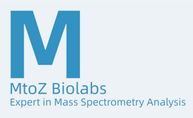
- Home
- Companies
- MtoZ Biolabs
- Services
- MtoZ Biolabs - Leukotriene Analysis ...

MtoZ Biolabs - Model leukotrienes-analysis - Leukotriene Analysis Service
1. LTC
2. LTD
3. LTE
4. LTB
5. 6-trans-LTB
6. 6-trans-12-epi-LTB
7. 20-Hydroxy-LTB
8. 20-Carboxy-LTB
Leukotrienes (LTs) are a group of inflammatory lipid mediators derived from arachidonic acid (AA) via the 5-lipoxygenase (5-LOX) pathway. A characteristic feature of LTs is that they are produced by leukocytes and share a conjugated triene structure. LTs consist of cysteinylleukotrienes (CysLTs) and leukotriene B4 (LTB). CysLTs contain a cysteine ring, whereas LTB is a noncysteine containing dihydroxy-leukotriene. The subtypes of CysLTs include leukotriene C4 (LTC), leukotriene D4 (LTD), and leukotriene E4 (LTE). The biological properties of LTs suggest that CysLTs play a crucial role in the pathogenesis of asthma. Currently, three CysLTantagonists are commercially available: Pranlukast, Zafirlukast, and Montelukast. BLT antagonists, specific regulators of LTB, are still under clinical development.4444414
LTs are derived from AA. They are rapidly produced at inflammation sites through a series of reactions initiated by cytosolic PLA(cPLA), releasing AA from nuclear membrane phospholipids. AA binds to the 5-lipoxygenase activating protein (FLAP) and is subsequently acted upon by 5-lipoxygenase (5-LO). The active site of 5-LO contains non-heme iron, transitioning from divalent to trivalent during catalysis. 5-LO, in conjunction with molecular oxygen, converts FLAP-bound AA to 5-hydroperoxy eicosatetraenoic acid (5-HPETE), forming the unstable and short-lived intermediate LTA. LTA is converted to LTB by the cytosolic enzyme LTA hydrolase. Inflammatory cells with complete membrane protein LTC synthase, such as eosinophils, basophils, mast cells, and alveolar macrophages, can synthesize CysLTs in response to biological and non-biological stimuli. LTC synthase conjugates reduced glutathione at the C6 position of LTA to form LTC. LTC synthase is also associated with FLAP in a multi-molecular complex. Both LTB and LTC are transported to the extracellular space via transport proteins. Once transported, LTC is rapidly cleaved by transpeptidase to produce LTD, which is finally converted to LTE by dipeptidase through the removal of glycine.2244444444444444
LTs primarily act on subclasses of G-protein coupled receptors and may also act on peroxisome proliferator-activated receptors. LTs are involved in asthmatic and allergic reactions and play a role in maintaining the inflammatory response. Certain leukotriene receptor antagonists, such as montelukast and zafirlukast, are used to treat asthma. LTs also play a critical role in the inflammatory response. Certain LTs, such as LTB, have chemotactic effects on neutrophil migration, aiding in the recruitment of necessary cells into tissues. They also have potent effects on bronchoconstriction and can increase vascular permeability.4
MtoZ Biolabs offers reliable, rapid, and cost-effective leukotriene analysis services and utilizes advanced LC-MS/MS systems for high stability, reproducibility, and sensitivity in its separation, characterization, identification, and quantification.
MtoZ Biolabs is an integrate contract research organization (CRO) providing advanced proteomics, metabolomics, bioinformatics, and biopharmaceutical analysis services to researchers in biochemistry, biotechnology, and biopharmaceutical fields. The name of MtoZ represents “mass to charge ratio” in mass spectrometry analysis, as most of our services are provided based on our well-established mass spectrometry platforms. Our services allow for the rapid and efficient development of research projects, including protein analysis, proteomics, and metabolomics programs.
MtoZ Biolabs is specialized in quantitative multiplexed proteomics and metabolomics applications through the establishment of state-of-the-art mass spectrometry platforms, coupled with high-performance liquid chromatography technology. We are committed to developing efficient, and effective tools for addressing core bioinformatics problems. With a continuing focus on quality, MtoZ Biolabs is well equipped to help you with your needs in proteomics, metabolomics, bioinformatics, and biopharmaceutical research. Our ultimate aim is to provide more rapid, high-throughput, and cost-effective analysis, with exceptional data quality and minimal sample.
Email: marketing@mtoz-biolabs.com
